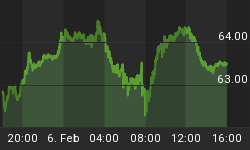Ben Bernanke was instrumental in creating a bubble in U.S. Treasuries. His actions have served to inflate it to the point that it has now become the greatest bubble in the history of global investment. Not only has the Chairman of the Federal Reserve guaranteed that current bond holders will get destroyed once the sovereign debt bubble bursts, but he has also begun to inflate yet another massive bubble in U.S. equity prices.
In the summer of 2007, just before the start of the Great Recession, the Fed Funds rate and the One year T-bill were both trading north of 5%. Then, starting in September of 2007, the Fed began to aggressively lower its target rate on interbank lending. Global investors were put on notice that bond yields, which were already at low levels, would soon go down to unchartered territory. Both the Fed's target rate and the One Year T-bill would be near zero percent by the end of 2008. And smart investors made a fortune taking the toboggan ride down Bernanke's yield slope.
But now we find the central bank doing something it has never done before. Something that will guarantee the Fed will prick the very bubble it worked so hard to create. First interest rates were taken down to the zero percent range. Then, the Fed adopted an inflation target. In other words, a minimum rate of decline in the purchasing power of dollars--a rate that is once achieved by official government metrics will be much greater in the real world. And then Bernanke more than doubled the amount of debt monetization to a record level of $85 per month starting in January 2013 -- with an indefinite duration. How can any sane investor really still desire to put new money to work in the bond market under that scenario?
Leave it to the government to do exactly the wrong thing at the exact worst time; while all along claiming to have the country's best intentions in mind. First, our central bank created a housing bubble in order to increase home ownership, which led to an overleveraged consumer and banking industry. Then, when the housing market toppled on top of the private and financial sectors, the government bailed them both out by taking on an unprecedented amount of debt. This was done in order to save us from a depression. So much debt, in fact, that the Fed had to artificially peg interest rates at zero percent just to keep the country from going completely bankrupt. So what's the absolute dumbest thing a central banker could do now? Put sovereign creditors on notice that the Fed will continue to print money until inflation is well entrenched into the economy.
Inflation is the bane of any bond market. A sustained increase in aggregate prices, along with a currency that is losing its purchasing power, will cause yields to rise faster and higher than any other economic factor. What the USA really needs to do is convince Treasury holders that inflation will not become a problem and the central bank is encouraging deflation to occur. Instead, our Fed Head is printing trillions of dollars with the expressed intent to push inflation higher.
Investors were already aware that there is little room for yields to fall any further. But now are being told by the Fed that they will continue to lose an ever-increasing amount of money, as real yields are guaranteed to go further and further into negative territory. Therefore, any new money created by the central bank is no longer going into government debt, but is instead rushing into stocks and commodities.
I expect this condition to intensify greatly this year and cause equity and commodity prices to soar substantially. Of course, the move higher will not be due to a booming economy. Just think about the negative Q4 2012 GDP print and the rising unemployment rate reported last week. However, strong money supply growth and the passing of fixed income as the preferred repository of new funds will cause commodities and equities to boom. This huge move higher -- especially in commodity prices -- will remain in place until the Fed or the free market begins to raise interest rates.
Keep this in mind; with $16.5 trillion in Federal Debt and $12.9 trillion in Household debt, the last thing the Fed can do is cause debt service payments to increase substantially. Therefore, since a depression and a bankrupt nation awaits us on the other side of the Fed's bond bubble, I expect it will not be until inflation becomes a serious and undeniably-painful condition for the economy that Mr. Bernanke begins to change his mind. And any change that does eventually occur will be slow and gradual...at best.















